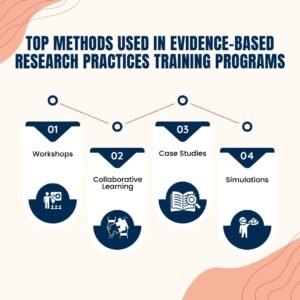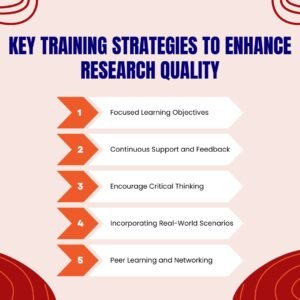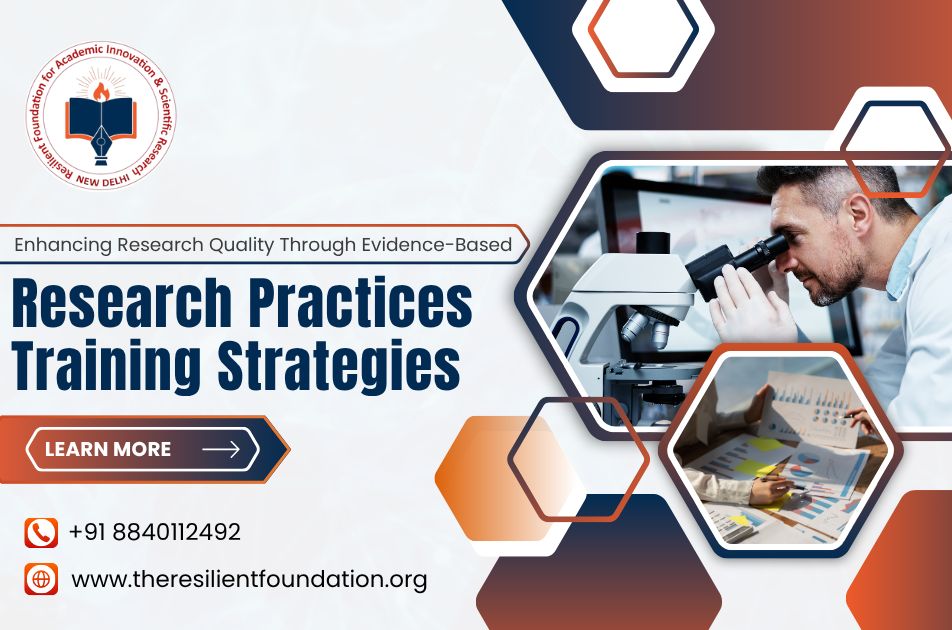Research helps us find answers to problems. Also, to make it useful, the quality must be good. Yet, one way to improve it is through evidence-based research practices training. Exactly, this training teaches better research methods and teamwork. Plus, it also helps improve research skills. Thus, here, we will share top methods, how technology helps, key strategies, and dos and don’ts to help researchers do better work in their field.
Top Methods Used in Evidence-Based Research Practices Training Programs

Evidence-based research practices training, thus, helps researchers learn better by using simple, useful methods that, in turn, make learning easy and clear.
- Workshops: Workshops help in practical research skills development by learning through doing, listening to experts, and group work. They also teach how to use evidence-based research in real life.
- Collaborative Learning: Research collaboration means working with others to solve problems. It helps researchers share knowledge, learn new things, and find better ideas. Because working together makes finding answers easier.
- Case Studies: Case studies are real-life examples. Specifically, they show how evidence-based research worked before and help researchers understand as well as use it better.
- Simulations: These are like practice. Researchers use them to try what they learned. It is safe and helps them feel ready, strong, and sure before doing real research work or problems.
Leveraging Technology for Evidence-Based Training Modules
Technology has a big role in evidence-based research practices training. Also, using tech makes the training easy to join and more helpful. Here are some simple ways tech helps:
- Online Training Platforms: These platforms help researchers learn in their own time. They can watch videos, do quizzes, and read lessons whenever they are free. This makes it easy to add training to their busy day.
- Virtual Collaboration Tools: Tools like video calls and online workspaces help researchers work together from different places. These tools improve research collaboration by making it easy to share ideas and work as a team.
- Data Analysis Software: Training programs help researchers learn special software to study and understand data. This helps in research and development by making better decisions using the information they find in simple ways.
- Interactive Sessions: Live online classes where experts teach and give answers. These classes help researchers learn new research ideas and evidence-based plans. They can also ask queries and learn from each other.
Techs not only make training more engaging, but they also give researchers the chance to learn in various ways.
Key Training Strategies to Enhance Research Quality
To make evidence-based research practices training better, we need certain strategies. Mainly, these strategies help researchers get the most out of their training:

- Focused Learning Objectives: It’s vital to have clear goals for the training. When researchers know what they need to learn, they can focus better and pick up useful skills that help them in their work.
- Continuous Support and Feedback: Researchers need help even after the training. Giving support and feedback helps them improve. They should have someone to ask queries and get help while using what they’ve learned.
- Encourage Critical Thinking: Critical thinking means thinking in a clear and smart way. Training helps researchers ask questions, check if something is true, and pick better ideas. This helps them make their work better and do good research.
- Incorporating Real-World Scenarios: Training should have real problems that researchers may face. This helps them understand and use evidence-based research practices better. It also shows how to use what they learn in real work.
- Peer Learning and Networking: It’s good for researchers to work together and talk about their ideas. Learning from what others have done helps you grow. Meeting people and sharing knowledge makes researchers better and feel supported.
These strategies, hence, help researchers gain the skills they need; thus, they make their research better.
Dos and Don’ts for Effective Evidence-Based Research Practices Training
Here are some dos and don’ts: Firstly, on one hand, the dos include… Yet, on the other hand, the don’ts are.
Dos:
- Do Provide Clear and Structured Content: Make sure the training material is easy to understand and clear. This helps researchers learn better and use it in their work.
- Do Foster Collaboration: Let researchers work together. Then this helps them learn from each other and improve their skills.
Don’ts:
- Don’t Overwhelm Participants with Information: Don’t give too much info at once. Instead, focus on the most important ideas and then build on them slowly.
- Don’t Ignore Real-World Applications: Make sure that training connects to real research issues. This makes it easier for researchers to apply what they learn to their work.
Conclusion
At Resilient Foundation, we help improve research quality through evidence-based research practices training. We give simple tools and support to help researchers do better work. With teamwork, smart ideas, and easy strategies, we help build strong research skills. Join the Resilient Foundation to learn more and grow your research. Together, we can make research better for everyone.

